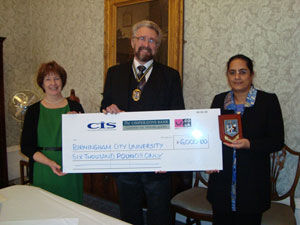University News Last updated 19 January 2011

The Deputy Lord Mayor has donated money to Birmingham City University to help revive manufacturing in the region.
Michael Wilkes has used the Lord Mayor’s charity fund to make a donation of £6000 to the University’s Faculty of Technology, Engineering and the Environment. The money will be used to reward and support some of the University’s outstanding undergraduate engineering students.
Councillor Wilkes, who was the previous Lord Mayor and also held the post of the University’s Chancellor, wants to revive Birmingham’s once world-class manufacturing sector. He said: “A lot of Birmingham’s traditional engineering companies have disappeared and I would like to do my bit to help strengthen engineering across Birmingham and the West Midlands.
“I am especially keen to see resurgence in mechanical engineering because it is creative and involves making things. Manufacturing is essential because I believe an economy the size of Brittan’s can’t be sustained by just a service sector – we need a strong manufacturing industry too.
“During my year as Lord Mayor I had the opportunity to donate money to two good causes of my own choice, one of which was to encourage the study and teaching of engineering. Whilst Lord Mayor I also held the post of the Chancellor of Birmingham City University and have a high regard for the work the University has done in Birmingham and in the wider region.”
“We need more young people to take an interest in engineering and this is my attempt to raise engineering’s profile. I would like to see engineering play a larger role in Birmingham and I believe that increasing the profile and number of engineers – at all levels – will help.
Associate Dean of the University’s Faculty of Technology, Engineering and the Environment, Peter Rayson said: “When Cllr Wilkes took office as Lord Mayorone of his objectives was raising the profile of engineering education within the city.
“He was very active in this regard and showed a keen interest in the Faculty’s undergraduate and postgraduate programmes and our external industry collaborations. He actively supported the Faculty at many of our event events and at the end of his period in office he told us he wanted to leave a legacy, for which we are very grateful.”